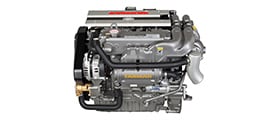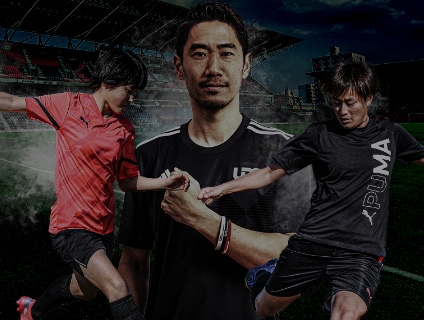 Special Discussion
Special Discussion

Thriving abroad requires expressing yourself.
Shinji Kagawa and Honoka Hayashi share a lot in common, despite being ten years apart in age. Both started their careers at Cerezo Osaka, moved to Europe, and primarily play in midfield. This conversation took place just as Kagawa returned to Cerezo this season after 12 and a half years away, playing a crucial role in the team's success, while Hayashi had just completed her first season in the English FA Women's Super League. It was the day after the announcement of Nadeshiko Japan's squad for the FIFA Women's World Cup Australia & New Zealand 2023, which kicks off on the 20th of this month. While a little nervous going into the conversation, Hayashi shared her feelings and experiences of playing in England for the first time, and Kagawa, her career senior, offered some passionate words, making for a highly engaging conversation.(Date of interview: June 14, 2023)

Kagawa:Congratulations on making it to the World Cup squad!
Hayashi:Thank you very much.
You two are 10 years apart in age. Are you acquainted with each other?
Both:This is the first time.
Kagawa:Are you 25 now?
Hayashi:Yes.
Kagawa:You're so young (laughs). How many years did you play for Cerezo?
Hayashi:I joined in the first year of junior high school, so 10 years.
Kagawa:Was it on to Europe after that?
Hayashi:Yes. I started playing in Sweden, and now I play in England.
Kagawa:That's quite impressive, playing for West Ham.
What was your impression of Mr. Kagawa at the time you joined Cerezo Osaka Ladies.
Hayashi:I had always watched Mr. Kagawa play since I was in elementary school. I remember that during an interview at the selection for Cerezo Osaka Ladies, I was asked which player I especially admired. My answer was Shinji Kagawa.
Kagawa:That makes me happy (laughs).
Hayashi:Yesterday, I remembered that and suddenly tensed up (laughs).
Kagawa:There's nothing to be nervous about (laughs).
Mr. Kagawa, since you are meeting face-to-face, what is your impression of Ms. Hayashi?
Kagawa:I have heard that she had always led Cerezo Osaka Ladies. She was selected for the Japanese national team for the World Cup, and as someone who has played in the World Cup, I hope this can be a fulfilling conversation for her as well.
Hayashi:Thank you.

Our first topic is Midfielder Theory. In Europe, Shinji Kagawa has often played the Number 10 or wing-half, but he plays midfield in his current position at Cerezo Osaka. He has led the team as a seasoned playmaker and a strong defender. Honoka Hayashi has been a defensive midfielder since her first days at Cerezo Osaka Sakai Ladies. She has played midfield exceptionally, both in offense and defense. We took a deeper look into how these two players, both of whom have excellent minds for football, including positioning, think and play on the pitch.
What do both of you, as midfielders, keep in mind during a match?
Hayashi:I have always been a defensive midfielder. In Cerezo Osaka Ladies, I tried to be aware of the entire pitch from midfield. I would cover on defense and provide support during offense. But, as time went on, I understood the importance of really putting myself forward. As I've grown older, I feel I've managed to achieve a balance. Now, I am trying to improve in both areas.
Kagawa:Playing internationally, it's a tough environment where you can't thrive without being able to express yourself, even more so than in Japan. I’ve experienced it myself, so I know how difficult it is to make it out there. Women's matches in England attract a large crowd, don't they?
Hayashi:Compared to Japan, there are definitely more spectators. Many girls of elementary and junior high school age come to watch.
Kagawa:Europe has a well-developed environment for playing football, including the culture and supporters, so it's definitely a pleasant atmosphere.
What is important for you as a defensive midfielder in setting up the match?
Hayashi:I'm really excited to hear your take (laughs).
Kagawa:I've only recently started playing as a midfielder, and while I have an ideal way of playing in mind, what I've been able to show on the pitch still hasn't fully lived up to that. Football is a team sport, but I also think of it as an individual sport, in terms of how much one can leverage their strengths for the team and prove their abilities. This holds no matter what position you’re playing. Of course, I've mostly played as an attacking midfielder or in forward positions, so I'm more accustomed to playing there. However, transitioning to a midfielder has meant I needed to make changes in how I play. It's a position that demands defense, and while I don't have as many opportunities to showcase my strengths as when I played further up the pitch, I'm always conscious of how much I can contribute to plays that lead directly to goals when I receive the ball in that last third of the field.
Thinking about the team while also figuring out how to express yourself. That's a common challenge for both of you, isn't it?
Both:Definitely.
Kagawa:Which position do you play in West Ham?
Hayashi:I play as either the number 6 (pivot player) or the number 8 (central midfielder) in a [4-3-3] formation. It changes depending on what the team needs and our opponent.
Kagawa:So you are both a pivot player and a central midfielder!
Hayashi:Yes. If the Number 6 player sits out, I play the Number 6 position.
Kagawa:Who is your favorite Number 6?
Hayashi:I've watched Sergio Busquets play since I was little.
Kagawa:No doubt for sure. I also think he is one of the best Number 6 players.
Hayashi:I want to play like him, but that's a massive difference in skill to bridge (smiles).
Kagawa:I guess it's good to keep those feelings in check and focus on being your best version (laughs).
Hayashi:Yes, it is (laughs).
Kagawa:Playing for the club, do you focus more on defense?
Hayashi:I look at which way the match is pivoting, and go from defense to offense. At Cerezo, I was also good at moving up front, so it's about balancing between wanting to move forward and keeping myself in check.
Kagawa:Right! As Japanese players we’re perceptive, so we often end up playing roles that are conscious of maintaining balance, don’t you think?
Hayashi:I tend to be used as a balancer (smiles).
Kagawa:In a field dominated by players with exceptional individual talent, Japanese players are often valued for their adaptability and team-oriented play. But if you have the ability to advance, you should also focus on nurturing and valuing your unique skills.
Hayashi:At Cerezo, I was always taught to be a goal-scoring midfielder, and I have been conscious of that for the past ten years, so it's become a part of me. I want to bring that out in Europe as well, but I struggled to demonstrate it in my first year playing in England.
A goal-scoring midfielder was something you strived to be when you went pro, isn't it, Mr. Kagawa?
Kagawa:Yes. An ideal midfielder can assist as well as score. When I first became a professional player, I was a midfielder and focused on how I could dribble the ball from my position for goals. Back then, most midfielders were game-setters, but I aspired to be a midfielder who scored. I hope you can continue to pursue what you aspire to be and the kind of play you value, even in England, Ms. Hayashi.
Hayashi:Thank you!
Never forgetting your strengths

Shinji Kagawa left Cerezo Osaka in the summer of 2010. After a sensational career in Europe, including back-to-back Bundesliga titles with Borussia Dortmund, Kagawa chose the Premier League as his next career move. The experience of persevering at Manchester United, a traditional powerhouse, has shaped who he is today. Meanwhile, Hayashi, after her European debut in Sweden, has played for West Ham United FC Women since last season. Drawing from their experiences, the two discuss the skills required to strive in physically demanding leagues.
The conversation from this point will focus on playing professionally in Europe (England).
We touched on this earlier, but do you tend to be surrounded by players who are strong individually?
Hayashi:I would say so. Especially for female players, the difference in physical abilities tends to be more pronounced than in male players. I tend to be overshadowed by other players when it comes to physical strength and speed. I play midfield, so while I don't often get in sprinting races, I often go head-to-head with wingers.
Kagawa:I was also aware that my best positions were attacking midfielder, pivot player, number 10 or 8, and I couldn't play on the wing (laughs).
Hayashi:Did you, like me, also feel a difference in physical strength and speed?
Kagawa:Absolutely, I experienced it too. I was one of the smallest on the team, and many players were faster than me. But, especially when it's impossible to win purely on physicality, it's essential not to forget your strengths. Japanese players can demonstrate their abilities in areas like technical skills and enhancing teammates' play.
That's a lot of valuable insight.
Hayashi:Absolutely!
Kagawa:I don't think there's a need to significantly change your foundation. After all, I went pro and made it to Europe because of my technical skills. When you play internationally, for better or worse, you get all sorts of influences, and there might be times when you lose sight of your own style of play. When that happens, having a solid foundation to go back to is invaluable, so it's important to keep it safe.
Do you ever lose sight of yourself?
Kagawa:That’s a challenge, isn’t it?
Hayashi:It definitely becomes a challenge (laughs).
Considering the language barrier with teammates and staff, I imagine there might be issues that can't be fully resolved at a deeper level.
How do you manage to overcome this?
Hayashi:I always make sure to give it my all at training. Even if I'm going through a rough patch in matches for about a month, where both my physical condition and mental state aren't at their best, I'll still focus on training. Sometimes, unexpectedly and without a clear reason, things just start to click and go well.
Kagawa:The tide turns sometimes, doesn’t it?
Hayashi:Absolutely! This time, it was great that things shifted back my way after about a month. I would have been worried if that sort of period continued for two or three months. Have you had times like that?
Kagawa:Of course I had my moments. But as you said, if you're training well, it will resolve itself in due time. If you can spend every day with a good mentality, the time to catch the wave will definitely come. After all, what matters is each day's cumulative effort. Even if you have 2 or 3 bad games, if you keep doing what you need to do, the right moment will definitely come. If you value daily practice and manage to have high-quality training, that can bring back confidence, and it leads to results on the field. Living overseas can be lonely, and it's easy to lose sight of yourself. You lose confidence, you have worries. But, the reason you're even able to play in Europe is that you have solid abilities, so it's important to remind yourself of your strengths and steadily keep at it. And then, achieve results. This is something you have to earn for yourself.
Hayashi:That’s very true.
Do you feel that you are growing in Europe, even when something is troubling you?
Hayashi:Yes. If I had stayed in Japan and kept playing for Cerezo, I probably would not have felt the same challenges. As I became more capable and was turning 22, I felt I needed to take the next step to grow.
Kagawa:You wanted a new and demanding environment.
Hayashi:Yes.
Kagawa:In that sense, things that don't go well are also opportunities to grow, and once you overcome the obstacles, you can become a better player. That's fantastic! You're playing in a great environment.
Hayashi:(Laughs)
You look like you're full of optimism, too, Mr. Kagawa (laughs).
Kagawa:Your environment is incredibly important for your growth. I want you to be proud and confident about playing where you are. I have nothing but respect for players who keep pushing forward in Europe.
Hayashi:There have been many tough times over the past year, but I'm glad I stuck it out (laughs).
It seems that you share many of the same feelings.
Kagawa:That’s really true. Sometimes, I get anxious, wondering what would happen if I couldn't play as usual for a long time. Or I might fall into a negative spiral. But, during those challenging periods, there might be activities with the Japanese national team or summer and winter breaks, when I can be with my family and enjoy delicious meals during Christmas or New Year's. That's when I find myself thinking, "Let's give it another go." These experiences can help turn things around for me.
Hayashi:Just going back to Japan and seeing family makes all the difference, doesn’t it? (laughs).
Kagawa:It's a refreshing change of pace. When you're worried, just remember there are many opportunities to turn things around. I wish you the best.
Hayashi:Thank you so much!
Kagawa:I think it's a tougher environment for women than men, and I would like to see more media coverage of Nadeshiko players playing internationally.
Hayashi:I think that will depend on how we do in the World Cup.
Kagawa:Winning over people's attention with results is important, but I don't think you should be too worked up about it. I want you to be proud of the fact that you are playing in Europe. I am looking forward to you playing in the World Cup, of course, but I am also looking forward to seeing you play in the upcoming season in the Premier League.
Hayashi:Thank you for so many inspiring words today. I'll use them as my motivation to work really hard! (laughs)

The conversation concluded with the question, "What does Cerezo Osaka and its future mean to you?" This year has been a milestone, in several ways, for Cerezo Osaka, the starting point for both of your careers. In December, the men's team celebrates its 30th anniversary since the club's founding, while the women's team will enter the WE League, the top-flight for women, starting next season. Both will compete on the highest stage in Japan. As both the men's and women's teams strive and refine their abilities together, what is the future of Cerezo that both of you envision on its new journey?
It's undoubtedly the club that shaped who you are today. What does Cerezo Osaka mean to the two of you?
Hayashi:I played for 10 years from the first year of junior high school, and it shaped my current style of play. I learned everything about football and thinking about the team at Cerezo, so if it weren't for Cerezo, I probably wouldn't be where I am, and I might not have continued playing football. It's a very important place for me because it nurtured me.
Kagawa:I also played at Cerezo when I went pro, and then I was able to go on to play for the Japan national team and abroad because of that, so I feel the same way.
How do you feel about the significance of having a women's team in the club, Mr. Kagawa?
Kagawa:As a fellow footballer, I am happy that people are excited about women's football because it means football as a whole is gaining popularity. Football has a profound impact on children. Our athletes in Japan, as well as those working hard internationally, regardless of their gender, have a great opportunity to send a message to people back home. They are giving their best worldwide, facing challenges alone that go beyond football. As someone who spread her wings from Cerezo, I hope that Ms. Hayashi receives more and more attention.
Cerezo Osaka Ladies will be the WE League next season. We would love to have a shout out from you, Ms. Hayashi.
Hayashi:Cerezo already has a solid style, and some of that can only be expressed because everyone has been working on it as one. I know that they’ll be a force to be reckoned with from Year 1. There's a solid team dynamic with players who have a long history of playing together and younger players who are training very hard. I'd like them to embrace a 'do-it-ourselves' attitude and set their sights on winning the championship from their very first year.
Cerezo celebrates its 30th anniversary this year, with a whole future still ahead. What kind of club do you want Cerezo to be going forward? And how would you like to contribute to that?
Hayashi:Right now, in the WE League, strong teams that come to mind are Nippon TV Tokyo Verdy Beleza, INAC Kobe Leonessa, and Urawa Red Diamonds Ladies. I hope Cerezo Osaka can work their way up to be among these teams, and become a strong club that people say is the best. I also think it's important to be an inspiring team that will boost women's football in the Kansai region. Of course, I love Cerezo the most and feel very close to them, so I hope to continue being involved with them in various ways.
Kagawa:Of course, I want to see the men's team continue to grow stronger. At the same time, European football has been around for more than a century, and from that point of view, Cerezo Osaka, which turned 30, is just getting started. Consistency within the team is essential to remain a strong team over the next 10, 20, and 30 years. This isn't just about the players, but the entire club, including the youth development system, needs to have a philosophy. Why have Kawasaki Frontale and Yokohama F. Marinos won championships, even consecutively? It's because they consistently adhere to their philosophy. I think Cerezo is still developing, so it's important to work steadily with an eye on the future. It's impossible for a club to remain strong without a clear objective. This means focusing on everything from youth development to building the right environment. For that to happen, we really need to put money and effort into both the organization and the players. I'm hoping that, in all sorts of ways, we can grow into a big, strong club that keeps racking up wins.
At the end of a lively discussion, Ms. Hayashi asked Kagawa some candid questions, and their first conversation came to a calm close.
Is there anything you would like to ask Mr. Kagawa on this occasion, Ms. Hayashi?
Kagawa:Please feel free to ask me anything.
Hayashi:When playing overseas, I tend to have quite a bit of free time after training.
Kagawa:I can relate to that.
Hayashi:In your case, Mr. Kagawa, how did you spend that time?
Kagawa:I was at home for the most part (laughs). When I was at Dortmund or United, we had matches every three or four days, so there were matches, practices, and a lot of traveling, but other than that, I was mostly at home. I also had a personal trainer, so I would either train with them at home or take care of my fitness.
Hayashi:I also stay at home all the time (laughs). Sometimes, I feel I should venture out into town since I have the chance.
Kagawa:I think it's important to take the edge off every now and then by going out to eat, for example. But, for better or worse, you get influenced by the outside. You might be bored when you're at home, but you can always remind yourself that football is what you are there to do. There's a lot you can do outside, but it can distract you from focusing on what you need to, and you might forget what's important. For a footballer, what's important is practicing every day, and to give your best, it's important to get proper rest at home. Nothing wrong with staying at home!
Hayashi:I’ll relax at home in peace then (laughs). Thank you very much for today!


- Honoka Hayashi
- Born May 19, 1998. 25 years old. From Uji, Kyoto. Kyoto Shinmei J.S.C. Sports Youth Club → Cerezo Osaka Ladies U-15 → Cerezo Osaka Ladies → AIK Fotboll/Sweden → West Ham United/England. She has been selected for the FIFA Women's World Cup Australia & New Zealand 2023 to be held this July.
- Shinji Kagawa
- Born March 17, 1989. 34 years old. From Kobe, Hyogo. FC Miyagi Barcelona Junior Youth → FC Miyagi Barcelona Youth → Cerezo Osaka → Dortmund (Germany) → Manchester United (U.K.) → Dortmund → Beşiktaş (Turkey) → Dortmund → Zaragoza (Spain) → PAOK Thessaloniki (Greece) → Sint-Truidense V.V. (Belgium). Returned to Cerezo Osaka starting from the 2023 season.






















